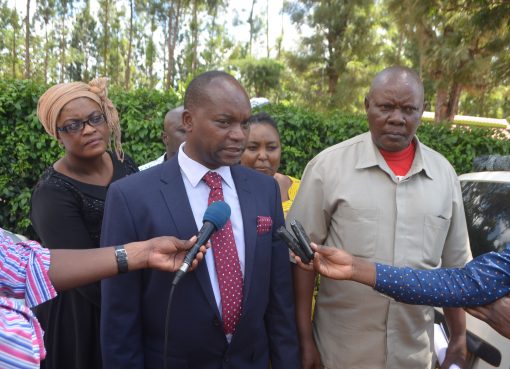Farming has been and still is a major backbone of our Country’s economy which greatly relies on crop and livestock farming.
Farmers from various parts of the country which are considered to be the food basket are working round the clock to ensure that they reap maximum benefits through farming by trying out new modern farming technology which includes planting, crop rotation, irrigation and harvesting methods.
Although some farmers still rely on the old traditional farming methods, others who are risk takers are trying to adopt new farming methods with innovators coming up with new techniques which will eventually improve the activity or stagger the usage of water which is the most important natural resource that is needed to farming.
Farmers who are keen on embracing technology are now able to save water for irrigation in their farms through the dripping solar, a new modern irrigation method introduced by young innovators.
The innovators who some live in Juja, a place notorious with drugs and crime, are trying to change the narrative by coming up with such great innovations that can benefit the society at large.
Such innovators, include Elijah Makewa, endowed with fresh knowledge from Jomo Kenyatta University of Agriculture and Technology (JKUAT), has opted to simplify the technology of preserving water for agricultural purposes.
Makewa alongside his three other friends, all students of JKUAT, some studying agriculture have come up with an innovation that will ensure farmers countrywide and beyond save almost 80 percent of water that they use for irrigation on their farms.
Speaking to KNA during an interview at the Jomo Kenyatta University of Agriculture and Technology (JKUAT), tech- expo last week, Makewa said that dripping solar is a company that makes automatic drip irrigation whereby they have designed a controller to facilitate irrigation instead of the farmer availing themselves to do irrigation himself or herself.
According to Makewa, the dripping solar uses light energy whereby a controller is connected to the drip irrigation gadget which uses solar energy hence reduces water wastage thus helping the farmer maximize on water supply that end up benefiting the plants to yield more produce.
“This method is mainly suitable in arid and semi-arid areas,” revealed Makewa, adding that their main goal was to target the ASAL where water is scarce and has to be preserved and be used only when necessary.
Juja being a semi-arid area experiences a lot of water shortage due to its growing population each day and was an ideal location for the innovators to try out their innovation.
Juja after the location proved to be a good platform for the innovators to try out their new innovation, they first started installing drip irrigation pipes at the institution of higher learning.
They then proceeded to connect the pipes to an automated system, a prototype that proved quite a success as it even caught the attention of some lecturers in JKUAT who advised them where necessary.
Makewa, revealed to KNA that they had previously thought of adding a little twist to the innovation by placing metallic pipes instead of plastic ones which are durable but they were dissuaded.
Another factor that could not allow them to venture into their first option was the cost of the metal pipes since they were quite expensive compared to the plastic ones which are cheaper hence affordable.
The other factor that encouraged the quartet to opt for plastic is that metallic pipes would react with sand and salty water hence could end up being corroded, clog and easily rust.
According to Makewa, the dripping solar uses light energy whereby a controller is connected to the drip irrigation which uses solar energy hence reduces water wastage thus helping a farmer fully maximize in water supply in the farm.
He revealed that the drip irrigation method has also helped other students in the same institution to think out of the ordinary by coming up with their own different projects.
They have hence been giving them advice and mentorship talks on their specific projects thus encouraging them to continue pushing and not to give up.
However, the biggest motivation that made Makewa who is one of the founder of dripping solar and a fourth year student at JKUAT to come up with the innovation is the fact that most dripping irrigation systems use electricity to pump and supply water instead of solar energy.
The Company comprises of four students whose main goal was to come up with affordable and clean energy and to save the farmers money, time and energy.
The four students led by Makewa managed to create a prototype which has attracted attention of some sponsors who are willing to chip-in to enable the innovation convince the global market.
However, Makewa regretted that lack of funds, accessing drip equipment’s and finding a market for the prototype has been quite a challenge, adding that they have been sponsoring themselves through family, friends and well-wishers which he admits is not easy.
Although they lacked adequate funds, Makewa admits that they kept fighting on and encouraging each other all through the journey until their project made it to the JKUAT tech Expo.
“We almost gave up at one time,” revealed Makewa, especially when the controller refused to work or at times shut down due to technical hitches.
He remembers one time when the controller broke down and they had to repair it themselves since no technician would do it considering they created the original masterpiece that only the four of them could understand how it operated.
The quartet kept pushing on until they came up with a controller that can easily be used to control and work much faster.
“We are aspiring to use clean energy which will also be affordable to the farmer,” said Makewa, insisting that modern farming methods are key to agribusiness and food security for the ever growing population.
The innovators aspire that in the next coming years dripping solar will be established in both local and international markets and enable farmers maximize on the cost of production.
The Tech-expo is an annual event held at the University of Higher learning in which innovators show-case their projects as they venture the job market. Through the event, some of the innovators have been able to attract the eye of a prospective employers or donor for the completion and roll out of their innovations.
Some innovators have found partners whom they can work with so as to complete their innovations.
By Gitau Karanja




